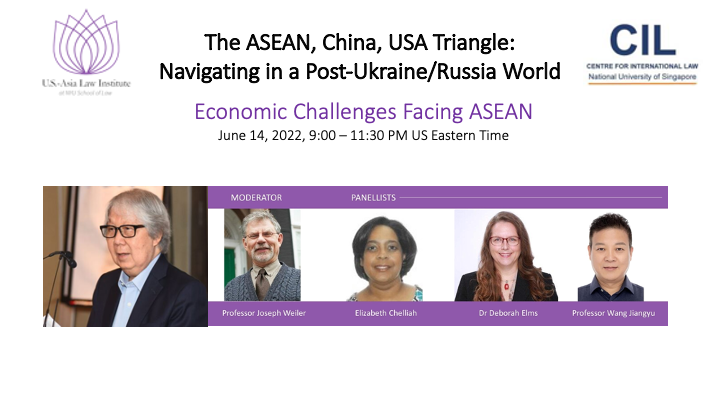Joint Virtual Symposium 2022
US-Asia Law Institute, NYU and Centre for International Law, NUS
The ASEAN, China, USA Triangle: Navigating in a Post-Ukraine/Russia World
The Centre for International Law at NUS (CIL) and the US-Asia Law Institute at NYU School of Law (USALI) are collaborating on a webinar that examines critical dimensions of the current status and future challenges of the relationships within the “triangle” of ASEAN, China, and the United States as well as ASEAN’s interactions with other interlocutory powers such as Japan. The recent geopolitical earthquake precipitated by events in Ukraine and Russia have rendered an already complex situation even more so.
SESSION 1: Economic Challenges Facing ASEAN
This event was recorded on June 14, 2022. See Part 2 below.
About the event
Trade has for some time been recognized as a major strategic parameter in international relations. China and the United States are, alongside the EU, economic giants that for some time have had a fraught relationship of both rivalry and co-dependence. ASEAN has found itself caught in the middle, walking a delicate diplomatic tightrope while trying to play a bridging role to maintain international stability essential for the well-being of all stakeholders.
The symposium opened with a keynote speech by the esteemed Professor Tommy Koh (Singapore’s former Permanent Representative to the UN in New York and former Ambassador to the United States of America, Canada and Mexico).
This is followed by a discussion that attempted to disentangle the complex relationships and highlight ASEAN’s challenges and potential.
Moderated by Professor Joseph Weiler, the distinguished panel comprised of:
Elizabeth Chelliah, Principal Trade Specialist, Ministry of Trade and Industry, Singapore
Dr Deborah Elms, Founder and Executive Director of the Asian Trade Centre, President of the Asia Business Trade Association
Professor Wang Jiangyu, Professor at the School of Law and Director of the Centre for Chinese and Comparative Law, City University of Hong Kong
Relevant reference materials:
Fact Sheet, Indo-Pacific Economic Framework for Prosperity, May 23, 2022
This event was recorded on June 16, 2022.
SESSION 2: Geo-Political Challenges Facing ASEAN
About the event
Throughout its history, ASEAN has been diplomatically adept in refusing to take sides on a wide range of geo-political issues that divide the US and its allies in the Global North (like Japan) and China and its allies (including many in the Global South). Since February 2022, as demonstrated by votes at the UN General Assembly and virtually daily announcements from governments in response to Ukraine’s pleas for assistance, the Russia-Ukraine conflict has put pressure on states to align with one side or the other in what could become new global blocs reminiscent of the Cold War. How does the new world disorder affect ASEAN’s diplomatic stance and its security goals and strategies?
This event consisted of an engaged conversation between the moderator, Professor José E. Alvarez, and the following distinguished panelists:
Ambassador Bilahari Kausikan, Chairman of the Middle East Institute
Professor Peter Dutton, Interim Dean, Center for Naval Warfare Studies, US Naval War College
Professor Kiichi Fujiwura, International Politics department; Director of Institute for Future Initiatives, University of Tokyo
Ms Susan Thornton, Senior Fellow and Visiting Lecturer, Yale Law School Paul Tsai China Center
Relevant reference materials:
ASEAN-U.S. Special Summit 2022, Joint Vision Statement
The Administration’s Approach to the People’s Republic of China, May 26, 2022 speech by Secretary of State Anthony J. Blinken

